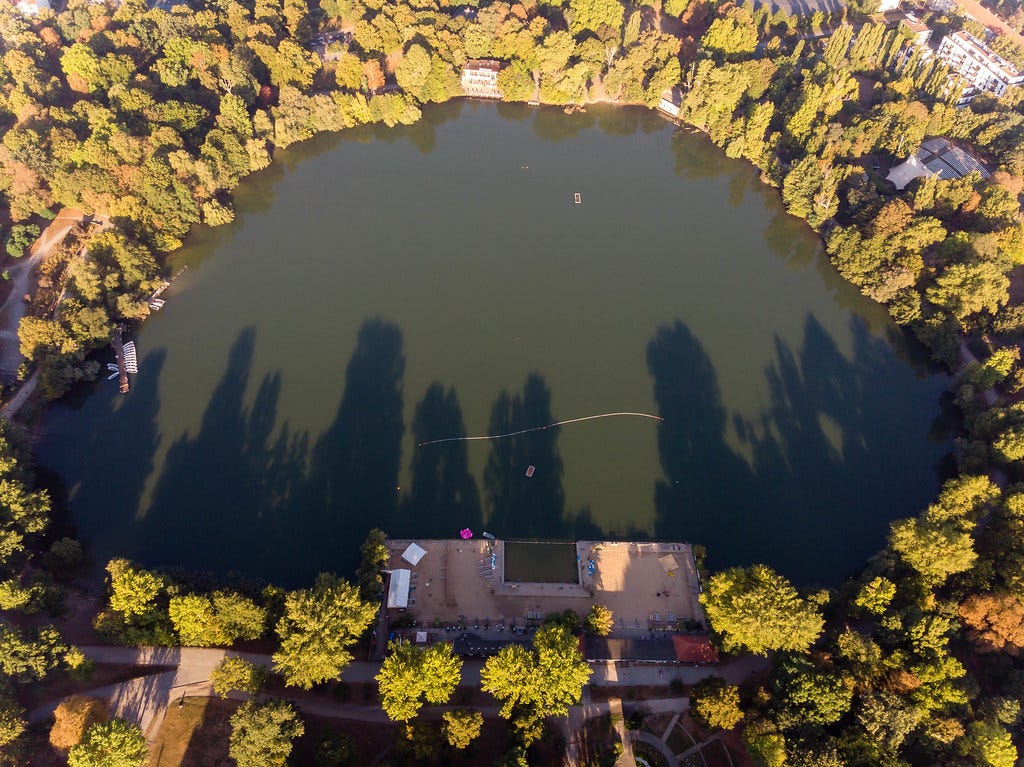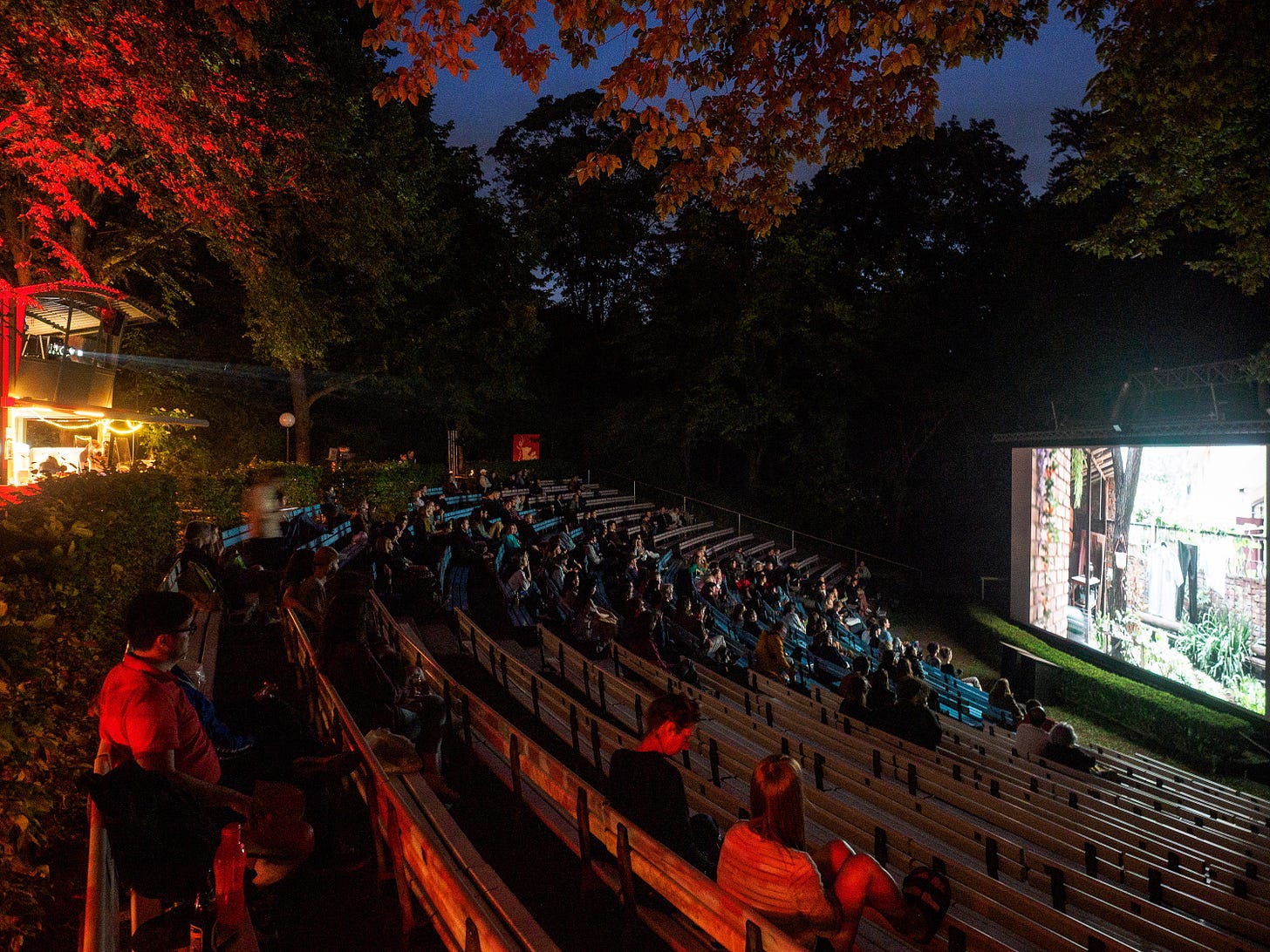#80: Open air cinema, Berlin's digital fail, wild swimming
And a new campaign to restrict outdoor advertising in Berlin.
Dear 20 Percent,
With temperatures forecast to rise again by the weekend, the Freiluftkino season is in full swing. Outdoor movies on huge screens is one of my favourite things about the Berlin summer. Of course, the mother of open air cinemas in is Freiluftkino Kreuzberg, hidden in the trees behind Künstlerhaus Bethanian in Kreuzberg. Practically all the movies in its programme are in English (or other languages) with German subtitles. And German movies comes with English subtitles. But many other venues have Ausländer-friendly programmes: the lovely Freiluftkino Hasenheide (photo), Freiluftkino Friedrichshain, Sommerkino Kulturforum near Potdamer Platz or the more intimate screen in the yard behind Kino Central in Mitte. For the Neukölln residents out there, the Freiluftkino Insel in Atelier Gardens south of Tempelhofer Feld appears to have a carefully curated international arthouse programme.
The acronyms in the listings can be a little confusing if you’re German’s wobbly. A guide:
OmU: Original mit Untertiteln (original version with German subtitles)
OmeU, OmEngU: Original mit englischen Untertitln (original version with English subtitles)
Dt.mit.engl.Ut.: Deutsch mit englischen Untertitln (German with English subtitles)
OV/OF: Original Version/Originale Fassung (no subtitles)
DF: Deutsche Fassung (German movie without subtitles or a foreign film dubbed into German, no subtitles)
Finally, the Berlinale film festival, now unhampered by corona, will be showing select films from its programme at five open air venues in the next few weeks, starting June 15. Get tickets before they sell out! Here’s the full Berlinale Goes Open Air programme with info in English.
The news is below!
Maurice
P.S. If you feel this newsletter makes life in Berlin a little better, feel free to help us out with a few euros on our Patreon, where sponsors get access to special giveaways.
The Berlin corona stats for Tuesday, June 7
Received booster: 61.2% (61.2% Friday)
New cases in one day: 1,083 (1,060 Friday)
Total deaths: 4,618 (+1 over Friday)
🔴 7-day Covid-19 incidence (cases per 100,000): 199.2 (217.6 Friday)
🟡 7-day hospitalization incidence (also per 100,000): 4.6 (4.7 Friday)
🟢Covid-19 ICU patient occupancy: 2.9% (3.2% Friday)
Source: Berlin’s corona page
Annual rail chaos
The long Pfingsten (Whitsun) weekend is, for the Germans, the start of the summer travel season which means that every year they flock to the beaches, lakes and forests. Predictably, the trains were packed to the hilt (even though there were more trains running) and many were quick to blame the €9 ticket for the masses of people who couldn’t make it onto overcrowded trains to the Baltic coastal cities of Rostock and Stralsund. However, as Der Tagesspiegel points out, the same thing happens every year. For the past 20 years, the papers have been printing a version of the headline “Whitsun rail chaos”. Berliners want out of the city come hell or highwater, whether it costs them €9 or €50.
Digital services fail
A mere quarter of government services are available online in the German capital, RBB reports, despite a Germany-wide deadline of the end of 2022 to fully digitise bureaucracy. Berlin offers 137 out of its 575 services online but common procedures such as applying for an ID or registering a new address still have to be done in person. Berlin’s “Chief Digital Officer” Ralf Kleindiek told RBB that this year 20 more procedures will be digitalised in Berlin, and 130 more in the coming year, including the registration of a new residence, motor vehicle registration, and housing benefit applications. Kleindiek was keen to stress that Berlin is not alone in its failure: “In no federal state are the 575 services even close to being provided online.”
Campaign against outdoor advertising
Berliners love their referendum campaigns. Last week we reported on a new citizen push to force the city to become climate neutral by 2030, this week our attention was drawn to the activists at Volksentscheid Berlin Werbefrei (English info here) who want new leglislation that would impose strict rules on outdoor ads. Their demands in a nutshell:
No product or service advertising in public spaces, except for at the business itself (e.g. at stores, salons, restaurants etc.)
Ads for events and non-commercial purposes permitted in designated areas.
Total ban on digital advertising in public spaces.
Wild swimming ban in Weißensee

On warm summer days, an estimated 4,000 people swim outside of the official beach area in the Weißer See, the centrally located lake in the Weißensee neighbourhood in the district of Pankow. Officials say shore areas are under strain thanks to “party tourism”, with trash piling up and trampled vegetation. Last summer, a man even drowned in the lake and a swan’s nest was destroyed. Pankow councilor for streets and green spaces Manuela Anders-Granitzki (CDU) has introduced stricter enforcement of existing rules in the park surrounding the lake: people riding bikes, BBQing, smoking shishas, feeding ducks or swimming from the shore will now be asked to pay a €30 “warning fine” if caught by the Ordnungsamt. Entrance to the officially sanctioned Strandbad Weißensee beach, the only place where swimming is allowed, costs €6.
Factoid
According to linguists, the name “Berlin” does not, as is commonly thought, derive from “bear”, the symbol of the city. Rather it’s believed to have originated from the Polabian stem berl-/birl- meaning “swamp” since the first settlement here was in a damp area on the current-day Fischerinsel in Mitte. The Polabian Slavs (or Wenden) lived in the region before German colonisation in the early Middle Ages — and their culture and language lives on in southeastern Brandenburg.




